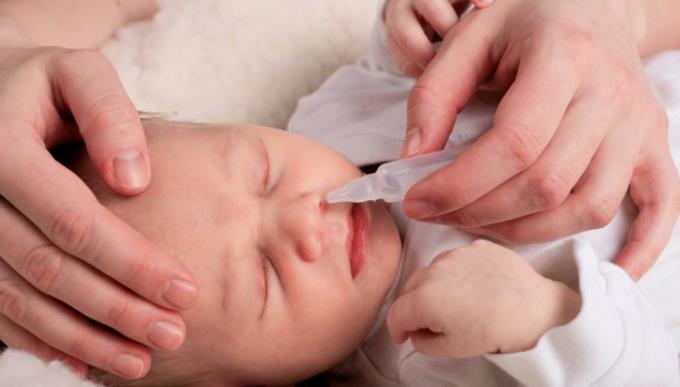The sudden change in weather makes it easy for children to suffer from nose and throat diseases. At this time, mothers need to clean the baby's nose regularly to treat rhinitis, and to prevent respiratory diseases. Only when the nose is washed properly, the mucus, foreign objects, germs in the baby's nose will be removed, making it easier for the baby to breathe.

Mother should regularly wash baby's nose to help prevent respiratory diseases
Because of its weak resistance and extremely sensitive to the external environment, babies are very susceptible to infections, especially respiratory diseases such as rhinitis, nasal congestion, and runny nose.

Top mistakes when treating a baby's runny nose Trans season is a very easy time to infect children, especially nose diseases. However, not all mothers properly treat a runny nose, leading to unfortunate mistakes. The following mistakes, mothers should avoid!
A child's nasal discharge in the first days of incubation is usually clear, thin and not much. Later, the fluid flows more and becomes thick, and turns yellow or green, and has a fishy odor if the disease is worse due to the growth of bacteria. If the nose is not cleaned properly, the nasal secretions containing bacteria flow down the throat, causing sore throat or into the ear causing otitis media .
To cure the baby rhinitis as well as prevent other diseases spread through the respiratory tract, mothers should know how to wash the nose for babies. Performed regularly, correctly and safely, your baby will quickly recover from the disease.
1 / Clean the child's nose with salt water
One of the best ways to wash a baby's nose is to wash it with saline. Physiological saline works to moisten the nasal mucosa, help loosen phlegm, dilute phlegm when the nose is heavily inflamed. Mother can be assured with this method, because saline is very safe, does not cause side effects.
When cleaning the nose for a baby, the mother should perform the following steps:
-Keep the baby lying on its head to one side. Place the nozzle of the salt water bottle close to the wall of the baby's nostril.
- Gently press the salt water bottle for 2-3 seconds. Mother can use spray or small form.
-Repeat with the other nostril. Blot the salt water and nasal discharge with a soft washcloth.
-If the baby's nasal discharge is thick, the mother can perform nasal suction. Wait about 2-3 minutes, using a nasal aspirator to suck mucus from the nostrils.
2 / Notes when washing the nose for babies
-Mother should clean the child's nose before eating to avoid vomiting.
- Try to wash the nose while the child is awake, because when the child opens his mouth, the runny nose will not flow into the throat.
-Avoid using the mouth to suck the nose for the baby, because this way can inadvertently make the child suffer from other respiratory diseases.
- Limit washing the child's nose with too much salt water when the child shows no signs of rhinitis. The mucus in the child's nose has the effect of creating natural moisture, preventing dirt from the outside environment. Washing the nose too much with salt water will atrophy the nasal mucosa, affecting the child's breathing.
-Many mothers pass on how to small garlic juice into the baby's nose to help babies breathe easier This method can easily cause burns, because the nasal mucosa is too thin.
>>> Discussions on the same topic:
Properly wash your child's nose
How many times a day do you wash your nose with saline?
Wash your baby's nose too much













